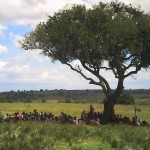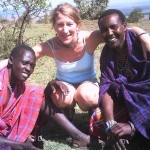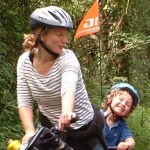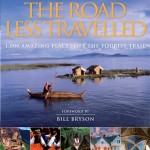 Having spent some time working with Dr. Cheryl Mvula of Tribal Voice Communications in Kenya (click here for this travel article) and seeing the extraordinary work she has done towards helping Maasai communities develop an ethical and sustainable source of income from tourism, I am over the moon to see that she has been shortlisted in The Virgin Holidays Responsible Tourism Awards 2009, organised by responsibletravel.com.
Having spent some time working with Dr. Cheryl Mvula of Tribal Voice Communications in Kenya (click here for this travel article) and seeing the extraordinary work she has done towards helping Maasai communities develop an ethical and sustainable source of income from tourism, I am over the moon to see that she has been shortlisted in The Virgin Holidays Responsible Tourism Awards 2009, organised by responsibletravel.com.
Launched in 2004, the Awards aim to celebrate those individuals, companies and organisations in the travel industry that are making a significant commitment to the culture and economies of local communities and are providing a positive contribution to biodiversity conservation.
Dr Cheryl Mvula who owns and manages Kent-based Tribal Voice Communications said: “It is great that our work in Kenya with the Maasai tribe has been recognised in these awards in the ‘Best for Poverty Reduction’ category. We have been working in Kenya’s Masai Mara since 2006 overturning decades of exploitation of the Maasai cultural villages there by Kenya’s driver guides. These villages are now benefiting from tourism for the very first time since setting up their tourism enterprises over 30 years ago and are now lifting themselves out of the poverty trap through their newly acquired tourism income. They have to date built their own schools, rain water harvesting and sanitation systems.”

The shortlist was selected by a panel of 13 prolific judges at a recent judging day held at The Royal Geographical Society, London. Dr. Harold Goodwin, Chair of the Judges and Professor of Responsible Tourism Management at Leeds MetropolitanUniversity said :
“Working our way through this year’s long lists, we were impressed by the willingness of so many organisations to take responsibility and to do what they can to help make better places for people to live in and better places for people to visit. This year over 140 submitted detailed responses to our questionnaire and we received hundreds of references. Despite the economic difficulties being faced by the travel and tourism industry, responsible tourism continues to move ahead and I’m continually impressed as more is achieved by more people. As judges we are all very aware of the great work that is being done by so many and our decisions are often very difficult and sometimes long debated”.
You can learn more about Tribal Voice’s work in Kenya on their website www.tribal-voice.co.uk.

 Just as Dubliners and its visitors are now discovering, with the arrival of Dublin Bikes, cycling definitely makes us smile. Is it that ‘get back in touch with nature’ vibe (albeit not really a feature of
Just as Dubliners and its visitors are now discovering, with the arrival of Dublin Bikes, cycling definitely makes us smile. Is it that ‘get back in touch with nature’ vibe (albeit not really a feature of  I headed to Paris for a three year stint in the early eighties, knowing noone and feeling very much the stranger in town. Someone recommended that I post an ad for digs at The American church there, as that is where most English-speaking expats congregated to exchange information. It worked – I found a flat, some cool flatmates, a bike, a futon, and a few party invites to boot. Social rather than spiritual guidance, it has to be said.
I headed to Paris for a three year stint in the early eighties, knowing noone and feeling very much the stranger in town. Someone recommended that I post an ad for digs at The American church there, as that is where most English-speaking expats congregated to exchange information. It worked – I found a flat, some cool flatmates, a bike, a futon, and a few party invites to boot. Social rather than spiritual guidance, it has to be said. One of the most fantastic ways to become a responsible traveller is to go off the beaten track. For example, you can benefit so many people economically by checking out Dublin’s International Theatre Festival instead of Edinburgh’s (and you are more likely to get a ticket too!). Go hiking in France’s Mercantour National Park instead of the Pyrenees National Park. Or head for the Isle of Wight’s superb surf instead of the burgeoning surf parks of Cornwall. In Ireland, discover the limestone karst wonders of The Burren, County Clare, instead of heading straight for the Giant’s Causeway on the Antrim Coast. Instead of just following Staffordshire’s motorway signs to spend a long, crowded day at Alton Towers, go off-road and spend a few days walking in its surrounding hills, otherwise known as the Peak District. The former is overrated, and the latter is most definitely underrated.
One of the most fantastic ways to become a responsible traveller is to go off the beaten track. For example, you can benefit so many people economically by checking out Dublin’s International Theatre Festival instead of Edinburgh’s (and you are more likely to get a ticket too!). Go hiking in France’s Mercantour National Park instead of the Pyrenees National Park. Or head for the Isle of Wight’s superb surf instead of the burgeoning surf parks of Cornwall. In Ireland, discover the limestone karst wonders of The Burren, County Clare, instead of heading straight for the Giant’s Causeway on the Antrim Coast. Instead of just following Staffordshire’s motorway signs to spend a long, crowded day at Alton Towers, go off-road and spend a few days walking in its surrounding hills, otherwise known as the Peak District. The former is overrated, and the latter is most definitely underrated.